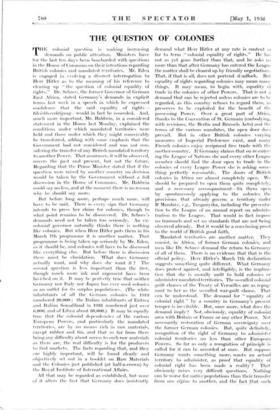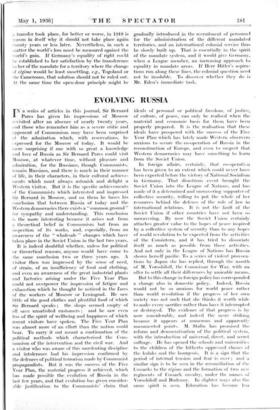THE QUESTION OF COLONIES THE colonial question is making increasing
demands on public attention. Ministers have for the last ten days been bombarded with questions in the House of Commons on their intentions regarding British colonies and mandated territories. Mr. Eden is engaged in evolving a discreet interrogation to Herr Hitler as to the meaning of his reference to clearing up " the question of colonial equality of rights." Dr. Schnee, the former Governor of German East Africa, stated Germany's demands in explicit terms last week in a speech in which he expressed confidence that the said equality of rights- GleichberechtigungL—would in fact he conceded. And, much more important, Mr. Baldwin, in a considered Statement in the House last Monday, explained the conditions under which mandated territories Were held and those under which they Might conceivably be transferred, adding with some emphasis that the Government had not considered and was not con- sidering the transfer of any British mandated territory to another Power. That assurance, it will he observed, covers the past and present, but not the future. Regarding that the Prime Minister stated that if the question were raised by another country no decision would be taken by the Government without a full discussion in the House of Conimons. Mr. Baldwin could say no less, and at the moment there is no reason why he should say more.
But before long more, perhaps much more, will have to be said. There is every sign that Germany intends to press her claim for colonies, though to what point remains to he discovered.• 1)r. Schnee's demands need not be taken too seriously. An ex- colonial governor naturally thinks there is nothing like colonies. But when Herr Hitler puts them in his March 7th programme it is another • matter. That programme is being taken up seriously by Mr. Eden, as it should be, and colonieS will have to he discussed like everything else. But before there is discussion there must he elucidation. What does Germany actually want, and why does she want it ? The second question is less important than the first, though much more ink and argument have been lavished on it. It may be perfectly true that neither Germany nor. Italy nor Japan has ever used colonies as an outlet for its surplus populations. - (The white inhabitants of all the German colonies in 1913' numbered 20,000 ; the Italian inhabitants of Eritrea- and Italian Somaliland in 1931 numbered just over 6,000, and of Libya about 30,000.) It may be equally I rue that the colonial dependencies of the various. European Powers, and particularly the mandated territories, are by no means rich in raw materials, except rubber and tin, and that so far from there being any difficulty about access to such raw materials as there are, the real difficulty is for the producers to find markets. The facts regarding that, and they are highly important, will be found clearly and objectively set out in a booklet on Raw Materials and the Colonies just published (at half-a-crown) by the Royal Institute of International Affairs.
All that may be regarded as established, but none of it alters the fact that Germany does insistently
•
demand what Herr Hitler at any -rate is content so far to term colonial equality of rights." He has not as yet gone further than that, and he asks no more than that after Germany has.. entered the League the matter. shall be cleared up by friendly negotiations. That, if that is all, does not portend deadlock.... But equality of rights regarding colonies may mean many things. It may mean, to begin with, equality of trade in the colonies of other Powers. That is not a demand that can be rejected unless colonies arc to be regarded, as this country refuses to regard them, as preserves to be exploited for the benefit of the possessing Power. Over a great part of. Africa, thankS to the Convention of St. Germain (embodying, with revisions, the Berlin and Brussels Acts) and the terms of the various mandates, the open door does prevail. But in other British colonies varying measures of Imperial Preference exist, and many French colonies enjoy reciprocal free trade with the mother-country. If Germany claims that on re-,enter- ing the League of Nations she and every other League member should find the door open to trade in the colonies of every League Poiver she is asking some- thing • perfectly reasonable. The doors of British colonies in Africa are almost completely open. We should be prepared to open them quite completely, and---a necessary accompaniment—fix them open by spontaneously applying to the colonies. the provisions that already govern a territory. under B Mandate, e.g., Tanganyika, including the presenta- tion to the League of an annual report on adminis- tration to the League. That would in faet impose 110 trammels and set no standards that are not 'being observed already. But it would be a convincing proof to the world of British good faith.
Mandated territories are another matter. They consist, in Africa, of former German colomeS, and men like Dr. Schnee demand the return to Germany of all of them. There is no evidence that that is the official policy. Herr Hitler's March 7th declaration suggests something quite different. What Germany does protest against, and intelligibly, is the implica- tion that she is morally unfit to hold colonies or administer mandated territories. The so-called colonial guilt clauses of the Treaty of Versailles are as repug- nant to her as the so-called war-guilt clause. That can be understocid. The demand for " equality of colonial right " by a country in Germany's present temper is inevitable. But, once more, what does the demand imply? Not, obViously, equality of colonial area with Britain or France or any other Power. Not necessarily restoration of German sovereignty over the former GerMan colonies. But, quite definitely, recognitiOn of the right of Germany to administer colonial territories no less than other Eurokan POWers. So far as only a recognition of piinciple• is called for it can be accorded at once. But suppose Germany wants something more, wants an actual territory to administer, as proof that equality of colonial right has been made a • reality? • That obviously raises very difficult*. questions. Nothing can be worse for native populations than their transfer from one regime to another, and the fact that such a transfer took place, for better or worse, in 1919. is reason in itself why it should not take place again twenty years or less later. Nevertheless, in such a matter the world's loss must be measured against the world's gain. If Germany's equality of right could be established to her satisfaction by the transference to her of the mandate for a territory where the change ,1' regime would be least unsettling, e.g., Togoland or the Cameroons, that solution should not be ruled out. At the same time the open-door principle might be gradually introduced in the recruitment of personnel ' for the' administration of the different mandated territories, and an international colonial service thus be slowly built up. That is essentially in the spirit of the mandate system, and it would give Germany, when a League member, an increasing approach to equality in mandate areas. If Herr Hitler's aspira- tions run along these lines, the colonial question need not be insoluble. To discover whether they do is Mr. Eden's immediate task.















































 Previous page
Previous page